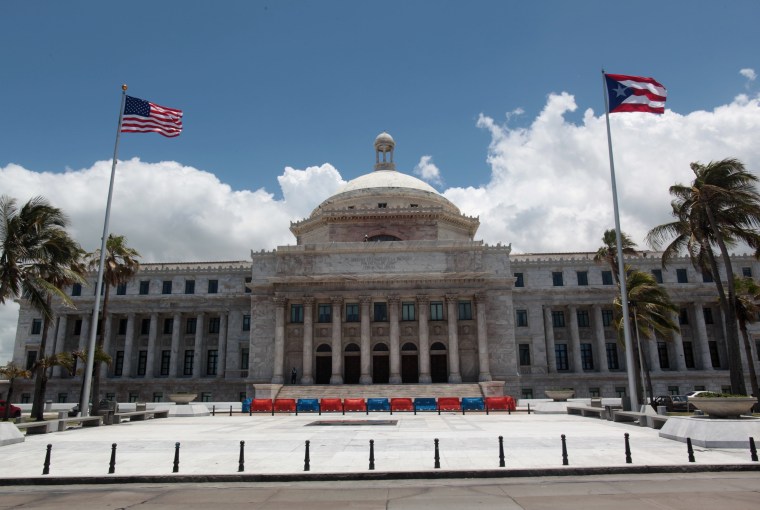WASHINGTON - In Samuel Becket’s play “Waiting for Godot”, Vladimir and Estragon wait for a man named Godot who never shows up. The title of the play sums up the entire plot – nothing really happens. Sounds a lot like what's happening in Puerto Rico.
The repetitive nature of island status politics parallels this absurdist play where the characters are trapped in a circular reality. No matter how many steps they take they always return to the same place.
In recent weeks the Governor of Puerto Rico, Ricardo Rosselló, traveled to Washington D.C. to demand statehood for the beleaguered American colony. The basis for his claim is a controversial plebiscite held on June 11 in which 97 percent voted for statehood but just 23 percent of registered voters cast ballots.

The Department of Justice signaled its indifference by not certifying the plebiscite nor releasing $2.5 million in Federal funds appropriated for this event. Congressional response to the Governor’s demands has been tepid at best.
Making a moral case for Puerto Rican statehood is straightforward. Puerto Rico’s relationship with the United States is undemocratic. As American citizens and veterans of foreign wars, Puerto Ricans should have the same political representation, rights and benefits as the other American citizens residing in the 50 states.
Mounting an economic argument is a different matter.
Even without its current $72 billion debt load Puerto Rico is poor by any standard. “Poorer than Mississippi” is how Puerto Rico is commonly described in the American press. (It must give Mississippians great comfort to know they are not last in line.)
RELATED: Puerto Rico Holds Vote Sunday on Statehood Amid Criticism Over Timing, Costs
Poverty is Congress’ primary objection to Puerto Rico becoming a state. The objection, however, is questionable because it assumes that Puerto Rico will never catch up or that the other 50 states are not a burden.
In 2016, 32 states took more out of the Federal kitty box than they put in, but who's counting? The possibility of Puerto Rico being represented by a Democratic congressional delegation is a secondary concern and only for Republicans.
The Commonwealth of Puerto Rico was created through an act of Congress and can be dissolved by another. If Congress wants to make Puerto Rico a state or a sovereign nation it can. That’s the way it works with American colonies.
But Puerto Rico’s political fragmentation into three opposing parties gives Congress a convenient and valid excuse to do nothing.
Representing the statehood party, the Governor of Puerto Rico claims that the recent plebiscite was an open and fair election and the results must be respected. Technically he is right. When Hawaii held its plebiscite in 1959, 94 percent voted for statehood but only 35 percent of eligible voters cast ballots; a higher percentage of the population than in Puerto Rico but not a supermajority.
Rosselló plans to send to Washington D.C. a shadow congressional delegation - two senators and five representatives – to lobby for statehood. The process, dubbed the Tennessee Plan in Puerto Rico, was followed by seven territories, including Tennessee, which managed to become states.
Washington’s disinterest bodes well for the commonwealth party, which wants to uphold the current status while it decides how to reinvent itself. Puerto Rican autonomy, the party’s raison d'être, was stripped away when Congress imposed a Federal control board in 2016 to balance the budget and restructure the debt.
The commonwealth party boycotted the plebiscite, even though the commonwealth option was on the ballot, because it considered it a waste of scarce government resources. Fair enough. Going forward, the party does not appear to have a plan other than keeping an eye on the statehood party and figure out how to win in 2020.
Finally, there is the independence party, the darling of Puerto Rican intellectuals and the Puerto Rican diaspora in the U.S. northeast. Its leaders speak with passion and are uncorrupted by power they never had.
Since the nationalist party was dismembered in the mid-twentieth century, its remnants have been unable to convince the population that an independent Puerto Rico has a viable economic future.
Less than 5 percent of voters support independence. After almost 70 years of relying on an imperfect federal safety net, Puerto Ricans are afraid of making it on their own.
Puerto Ricans think of their Island as a country, “el país” or “la patria”. Clearly at the heart of their collective indecision is fear of losing a national identity that for most Puerto Ricans is as important as their U.S. citizenship.
One would think that the current crisis would have swelled the ranks of statehood, which offers a viable economic pathway. But it has not. If anything, the imposition of a Federal control board has invigorated Puerto Ricans’ sense of identity.
RELATED: Puerto Rico Grapples With Foreclosure Crisis as Thousands Lose Homes
Students, unions and progressives have taken to the streets to protest austerity cuts required by the control board but they have not been joined by older, more conservative segments of the population.
For now, most Puerto Ricans are staying home, resigned. They're preparing for austerity the way they do for a hurricane, protecting what they can and keeping their sense of humor, knowing that the only way to avoid the storm is to get on a plane and leave.
Puerto Ricans sometimes use the phrase "así es la vida," (such is life) to point out that which they cannot change.
A similar line is repeated in "Waiting for Godot." One wonders how long will Puerto Rican leaders and the people who elected them wait in their absurd colonial reality before they make something happen or something happens to them.